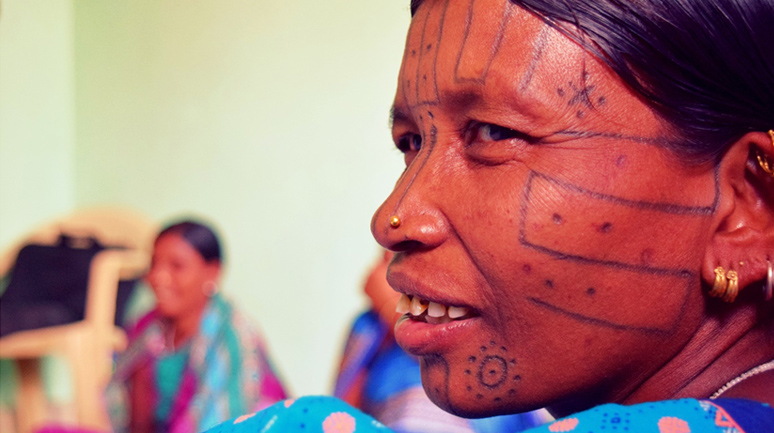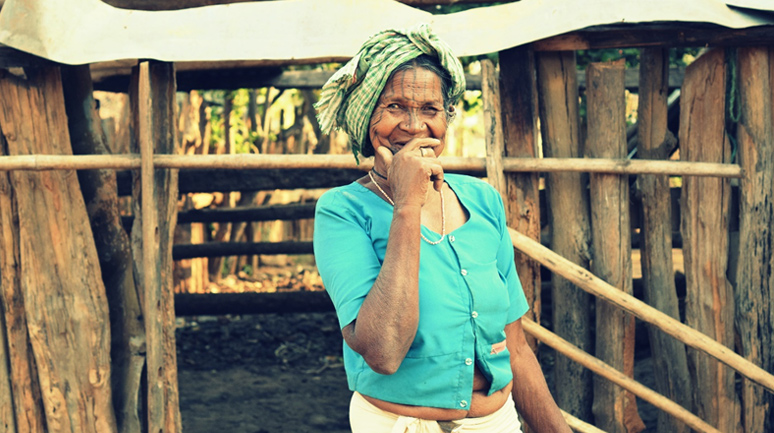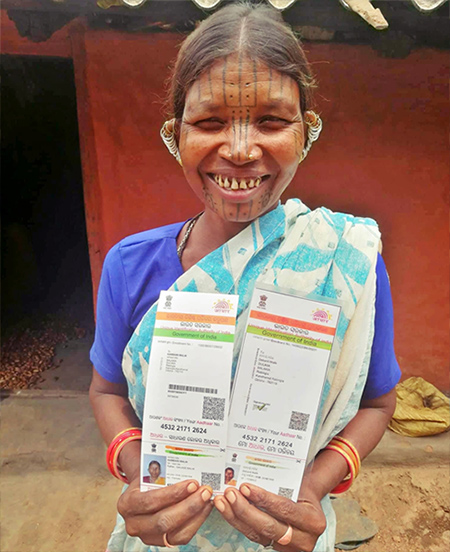The Missing Identities


Uprooting a girl from her familiar surroundings when she gets married, separating her from her family and friends, assuming she will merge seamlessly with her new family is a traditional, social expectation; carrying the ‘amputation’ even further is the custom in Balliguda of renaming a new bride with the name of her parental village; this completes the obliterating of her identity
"What is in a name? That which we call a rose by any other name would smell as sweet." William Shakespeare said that even if a rose were to be called by any other name, it would still smell the same; it would not lose its essential nature. If from this very moment, I start calling a car an aeroplane, an aeroplane will be called a bus.... will anyone bother? However, what if from tomorrow people start calling you by different names...let’s say by that of the place you reside in, for example, Ashish Singh is called Karol Bagh Singh and Yuvita Sen is called Salt Lake Sen. Will the name still not matter? What if I take you to a place where people are actually called by the name of the places?
W elcome to Balliguda, district headquarters of Kandhamal in Odisha state, where flowing streams, deep cutting gullies, slanted hills with dense sal forests mark the beauty of this place. Such is the attractiveness of Kandhamal, home to one of the primitive tribes of Odisha-the Kandh. The Kandhs are of the Dravidian stock and speak the Kui language. Do not judge them if you find them hostile at first; once you get to know them, they are the most cordial and warm people to be around. The Kandh tribe can be identified by their names
These are my observations from my engagement with the Kandh tribe as a development worker for the last 7 years. This article is trussed by a series of interactions with the people of this tribe; what I have witnessed about one of their customs and its change over time. I have often heard people saying that the only thing that remains constant in one’s life is your name but for some even that changes. Among the Kandh tribe, this traditional practice is followed even today.
The tradition is about changing names after marriage. Once a tribal girl gets married, she is no more called by the name given to her by her parents. If her birth name is Sabitri Mallick, she will not be called as Sabitri after her marriage. Instead, her in-laws will name her after the name of the native village; for example, Rasmita Mallick of Kambarkia village was renamed Kambari Mallick.
Once a tribal girl gets married, she is no more called by the name given to her by her parents. If her birth name is Sabitri Mallick, she will not be called as Sabitri after her marriage. Instead, her in-laws will name her after the name of the native village; for example, Rasmita Mallick of Kambarkia village was renamed Kambari Mallick
When she got married. Hence, in Balliguda block of Kandhamal, there are five to six Sangeli Mallicks in the same village, six to seven Kareli Mallicks and so on.
Imagine you arrive at Balliguda and are looking for a person. You do not have any details of her other than her name, let’s say Ganduli Mallick, and you also have her date of birth. With this little information, you begin your search. At the village, you call out for Ganduli Mallick; surprisingly, you find that instead of one there would be five women standing in front of you. How will you know which of these five is the one you are looking for? There is no point of asking them their names because all of them bear the same first name and the same surname. Perhaps, the simple thing you can do is to ask them their year of birth; however, to your dismay, you will hear a long silence from their side because women usually do not know their exact birth date, year or age. The next smart thing you might think of is to ask them for their identity card, voter id or Aadhaar. What if all the five Voter ID and Aadhaar reflect the same name ‘Ganduli Mallick’. The next thing you will be looking for is the date of birth but just as the universe is conspiring against you and so does the Election Commission of India and the UIDAI (Unique Identification Authority of India). You will find that the date of birth which you have of the women is not matching with any mentioned in the cards. In fact, it will be a shock for you to see that a 40-year-old woman has her age printed as 60 and a 70-year-old has her age as 45 in her identity cards. And if husbands followed the same tradition as the one imposed on the women, the scenario would be unimaginable, right?
These stories may sound like fiction to you; however, this is the bitter truth of their lives. By now you must have got the idea that this tradition only applies to women. Having started as a practice in a very informal space; it has sneaked into the much-reserved sphere of formal identity. Correlating it with the larger debate on identity and identity proof, what are the documents that these women have as proof of their identity?
How has a few letters that we have been scribbling all our lives on the covers of each notebook become so important? Do our names hold so much significance that it becomes a question of identity? Names are not just a socially distinguishing feature, it is related to the larger question of who we are and the identity that we have valued for a long time?
Do our names hold so much significance that it becomes a question of identity? Names are not just a socially distinguishing feature, it is related to the larger question of who we are and the identity that we have valued for a long time?
The series of memories we have made with it and the consciousness of being a person with that name makes these two inseparable. With time, our thoughts, our feelings, and its significance have become so strong that the name starts to matters as much as the person.
Kadukeli Mallick is a tribal woman now in her 80s and married at an early age of 13. When asked about her original name, she asked, “The name given by my parents?” ...Thinking hard... “I do not remember it anymore... It has been so long ...I can’t recall it...Once I came to this village after marriage I never heard that name again.”

S he has some vague memories of her childhood, which still play in her mind but the name, which once must have been dear to her and which echoed in her ears all day long is now long forgotten.
(Kareli, Kambari, Kadukeli, Baheli, Ganduli and Sangeli are names given to women if they hail from these particular villages.)
Kutami Mallick now in her 60s is hesitant to reveal her original name. “Which name you liked the most?” I asked. She said, “’Kutami’ is okay for me. I am comfortable with this changed name because for the last many years I have been known by this name. During the survey, the men of my village told my name as Kutami to the officer so this name got printed in all the documents.” Just when I started assuming that after so many years of hearing this name she had started liking it, she asked, “Didi, is it possible to change my name now?” and I smiled. She said she was going to name her granddaughter ‘Minati’, which is her original name.
Whereas this is what some women think about their identity, let me share what the men have in their minds on the same issue. In a meeting, I asked the men, “Can this practice be changed, because with time, traditional practices have changed their forms?” To which a man replied, “Is it ever possible that men and women can be the same, can ever women be compared to men?” The laughter of other men in the meeting on hearing this reply approbated the fact that this custom of changing names is not just a tradition but is deeply rooted to the age-old system of patriarchy, which places women at a subsidiary position to men. Reinforcement of patriarchy is not unique to tribal society; with time, it has taken various forms.
At the time of marriage, a Kandh bride is gifted a new name by her in-laws, and as a return gift, she has to follow all the social norms placed before her by the society. Because her name cannot be used in the village, she is forbidden to take the name of her brother-in-law in many cases even of her sister-in-law in front of them or any other living person.
It’s not like these women, whose names have been changed, have forgotten their original names and have happily accepted the name forced on them. There is discomfort. Many younger folks now want to retain their names but don’t know how. The voice inside them gets subdued by the louder voices they hear outside in their surroundings, and they find themselves alone. Is there really no way to break this chain?
“Please, didi, do not call me ‘Kambari’, I don’t like hearing it anymore. Call me Debanti,” says the 55-year-old Debanti Mallick. She belongs to Dulikia village of Balliguda block. Debanti is the name given to her by her parents; when she got married 27 years back, her name was changed to Kambari because she came from Kambarkia village. It was not a surprise for Debanti to be called Kambari because from her childhood she had heard her mother being called Gandeli. She clearly remembers her maternal grandparents calling her mother by her original name Ujanti, a name she liked. No one called her mother by that name in her father’s village; even she never dared to question that but now it’s different. Two years back she had her name changed to her original maiden name on her ID card.
This is the first ever such case that I encountered in the last seven years. I wondered what had triggered the feeling that was dormant inside her to come up now and make her realise the worth of the name associated with her from birth. What disturbed her to the core and made her take this step? With a smile she narrated about the meetings that she attended on the rights of women where there was a discussion about decision-making and ownership of women; of how society has created a bias against women where she doesn’t own any land title in her name and even her name does not belong to her. All those discussions triggered something in her, after which she applied and changed her name from Kambari to Debanti in all the required documents.
When asked about the certificates with her original name, she excitedly unlocked her old steel trunk and took out two Aadhar cards. She pushed both the cards towards me, the one with her name printed as Kambari and one printed as Debanti. One after the other, she took out all the documents where her original name was printed—her voter ID, ration card, her bank passbook. The twinkle in her eyes spoke of her happiness on being called by her name, DEBANTI.

I s it not that the human race is operating in assorted worlds? In one world, we are talking about empowerment and independence of women; in the other, we are forcing women to adapt an unknown name with no say of her own. With the unfamiliar name, she is moulded into a new identity that is created and imposed on her in the form of culture and tradition. These traditions, to which only women are subjected, are sadly never questioned; it is perpetuated from generation to generation. The dilemma over identity is a concern for a significant number of women today and, as usual, these topics are the least debated.
So much of our current existence is about identity. When a big part of a woman’s identity has been wiped out, what kind of image must she be holding about herself? Her sense of self is lowered to such an extent that before speaking in public forums she seeks the consent of the men in her family; when even after doing 80 per cent of the agricultural work she is not recognized or addressed as a farmer; when the major contribution in household chores, as well as the income generation, is hers, she does not possess the right to be called an owner. Questioning this practice of changing names is not just a question of culture any more but altogether a question of gender equality. To what extent are women being seen as equals, how much say do they have in making the law or breaking the law and what opportunities are we, as part of so-called progressive society, creating for them?
To bring a significant impact in the lives of these women, our society needs to do a lot more; even before that, it is important for women themselves to realise their self-worth. One notion that they need to dismiss from their minds is that they are not at par with men. Once their individuality and their sense of personal agency develops, they will no more be dependent on others and they will discover their own identity - the identity that went missing with their names, the identity which got lost in the process of valuing—customs.
The first step taken by Debanti Mallick in changing her name awakened her self-consciousness. This may seem to be trivial at present; yet this will lead to greater realisation - the realization of being an individual first. This is where Self-help Groups and other women’s collectives have a greater role to play. These women need to build a collective identity, which will be a trigger and will help these women address other atrocities also. CSOs can make conscious efforts to create awareness. The local administration will also need to extend their hand of support to this drive. These tiny steps, taken together, will help women paint a new identity of their own and transform the larger picture.


2 Comments
What a beautiful article..loved it ?
A very deep and meaningful engagement Akankhya.Namaskar to all didis of Balliguda.Keep it up.